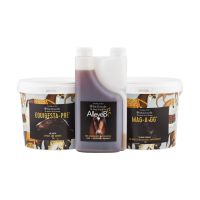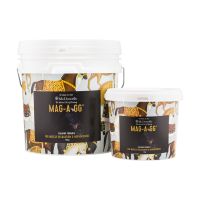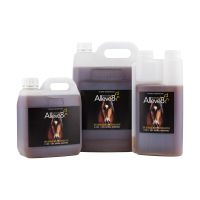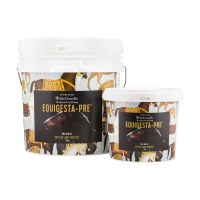As animals turn older, maintaining their weight can be tricky and challenging at times due to a variety of factors inclusive of the incapability to chew, potential parasites, or simply not receiving enough calories. As they age, most senior horses face the loss of muscularity.
Ensuring that your horse is healthy through regular veterinary exams every 3-6 months is crucial in maintaining your horse’s health. During these veterinary exams, it is important to ensure your horse’s teeth are in good condition. Worn-out or missing teeth are a common condition among senior horses and can make eating and digesting hay and hard grain difficult.
Blood tests during these examinations are also important to let you know the state of your horse’s internal organs and whether they have some sort of blood deficiency or anaemia.
The vet weighing your horse will also give you an indication of your horse’s condition and requirements. As horses get older, they lose muscle, especially over the top line. As a result, the backbone becomes more prominent and can lead owners to think that the horse is losing weight. If the loss in weight is real, your horse will need some adjustments to their diet.
Tips for Senior Horses’ weight-gain
Some horses are more inclined to be 'hard doers' while others have physical, environmental or emotional reasons for having difficulty in keeping weight on. You should never be in a rush for a horse to gain weight. Approach weight gain as you would weight loss - slowly and steadily, with their overall health in mind.
Investigating any underlying gastrointestinal issues is the first step to helping a horse gain weight.
We want to focus on building lean muscle mass and laying down healthy fat stores. Herbs play an essential part in rehabilitating a horse and building weight. By returning the horse's gut to an optimal condition he's got a much better chance of gaining weight more effectively - which means less fuss and less money being spent by you!
Limiting reliance on chemical wormers, antibiotics, and chemical anti-inflammatories like 'bute' is a step towards healing the gut. Overuse damages the gut wall, and creates ulceration and leaky gut.
Exercise has also been shown to be an important part of gut health. In the wild, horses walk around 22-24km a day. They have evolved as roaming, wild herd animals which means they function best in large, open areas of mixed pasture, tree coverage, and various footings along with herd mates. Obviously, it's not always practical to have all of these features for your horse, but we can replicate as many as possible.
There are three major energy sources for the horses - fibre, starch and fat - and they all play a part in weight and energy levels. 'Putting weight' on a horse isn't about laying down fat stores.
Fibre
Grass and hay are the generally main supplies of fibre for horses. They are also considered the 'safest'. New, green shoots are much higher in digestible fibre (sugar) than dry, brown, summer grasses. When good fibre is not available or if the horse does/can not eat hay, there are other fibre sources. Beet pulp is about 80% digestible fibre (compared to 50% for hay) and makes an excellent base for adding herbs, oils, supplements, and tonics.
Starch
Grains are the most common form of starch for horses. Some starchs, like oats, are digested more easily compared to corn or barley. These grains are better if they are steamrolled and/or cooked. Grains can be overfed, causing a myriad of problems, like the most common one, colic! This is caused by a microbial disruption. Remember that horses did not evolve to eat grain in large amounts - in the wild, they would have eaten some seed heads off grasses.
"The minimal amount of forage a horse requires is 1% of its body weight. Therefore, a 450-kilogram horse needs a minimum of 4.5 kilograms of hay or high-quality grass per day to maintain a reasonable balance of the microbial population."
Fats
Adding fat to the diet is one tool for achieving weight gain, as it adds energy without adding additional grains. It must be introduced slowly and works best if fed with digestible fibre sources (see above) like beet pulp, good pasture, and good quality hay.
Normally, horses have no problem digesting fat as long as it is introduced gradually into the diet and not overfed. Fat works best when fed with some grain and highly digestible fibre sources like beet pulp or good quality hay or pasture.
Other common sources of fat include rice bran, linseed, sunflower seeds, hemp seed oil and coconut meal (copra meal). Rice bran is an excellent product for improving body condition and topline of thin horses because it is a combination of rice oil and highly digestible fibre.
Increasing the caloric intake of a horse is not problematic if careful attention is paid to the feed offered to the horse. Manipulation of the amount and variety of energy sources will often achieve the ideal body condition on the hard keeper.
McDowells Products
McDowells Senior Horse
This program was formulated to address the underlying gastrointestinal issues that are present in senior horses, provide calming to the nervous system, and a safe Bute alternative.
Equigesta-Pre
Equigesta-Pre contains a combination of pure herbal powders, brewer's yeast and bentonite clay. Traditionally this combination has been used to aid and promote beneficial intestinal microorganisms.
Our unique blend can be used daily as an equine prebiotic to support and stimulate the growth and activity of good bacteria in the digestive system.
Alleve8
This formulation has evolved from a consideration of the dangers of administering phenylbutazone (Bute) routinely to horses sensitive to its side effects. Traditionally White Willow Bark and Devil's Claw were used to manage pain. Guaiacum was traditionally used for Gout and Burdock as a blood cleanser for Rheumatoid processes. Maritime Pine Bark, Rosehips, Elecampane with its Allantoin content, together with Yarrow in a Vinegar base all support and encourage repair.
This formulation may be used safely for both emergencies and in the long term for comfort.
The tonic will need to be given continuously for a minimum of 3 weeks and can be maintained long-term if necessary. Improvements are usually observed within 3-6 weeks on the tonic.
Fermented tonic to support a healthy microbiota.
100% chemical-free
24-hour withholding period for animals scheduled for surgery
Safe for the stomach
Safe to give long-term
Can increase dose safely in times of injury/trauma/oedema
Can be added to feed
Can be safely given alongside veterinary medications
Mag-a-GG
Mag-A-GG is a 'calming formula'.
A combination of Magnesium oxide, brewer’s yeast, chamomile and dandelion specially formulated to assist in muscle relaxation and nervousness.
Supplementing a horse known to be deficient in magnesium has been shown to have beneficial impacts on their flight response and general nervousness. Magnesium also activates enzymes necessary for the metabolism of carbohydrates and amino acids which lead to protein synthesis.
- Yeast is a rich source of B vitamins including thiamine and selenium which are essential for effective nerve transmission.
- Chamomile is well known and used for relaxation and calming nerves.
- Dandelion has been used successfully to aid in liver function and is an excellent source of Choline with vitamins A, C, D and B complex. zinc, iron and potassium.





